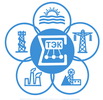Department of Artificial Intelligence Systems in Energy 10
The main scientific directions of the department:
1. Methods and technologies of semantic (ontological, cognitive, event and probabilistic) modeling, visual analytics and cognitive graphics for intelligent decision support in the energy sector.
2. Methods for constructing an ontological knowledge space in the field of energy and knowledge management technology.
3. Methods and technologies for supporting collective expert activities, BigData technologies (processing of large amounts of data).
4. Methods for constructing multi-agent systems for energy research and agent-service technologies.
5. Machine learning methods and technological solutions developed with their use.
6. Methods of cyber-situational awareness of energy facilities, technologies, and software tools for threat analysis and cybersecurity risk assessment.
7. Methods for constructing and implementing digital twins of energy facilities, as well as smart digital twins of energy systems and the fuel and energy sector.
8. Methods for integrating studies on sustainability (resilience) of energy and socio-ecological systems using the quality of life as an integration factor.
9. Methods for building an IT infrastructure for systems research in the energy sector and developing intelligent systems to manage the expansion and operation of energy systems based on digital twins.
1. Methods and technologies of semantic (ontological, cognitive, event and probabilistic) modeling, visual analytics and cognitive graphics for intelligent decision support in the energy sector.
2. Methods for constructing an ontological knowledge space in the field of energy and knowledge management technology.
3. Methods and technologies for supporting collective expert activities, BigData technologies (processing of large amounts of data).
4. Methods for constructing multi-agent systems for energy research and agent-service technologies.
5. Machine learning methods and technological solutions developed with their use.
6. Methods of cyber-situational awareness of energy facilities, technologies, and software tools for threat analysis and cybersecurity risk assessment.
7. Methods for constructing and implementing digital twins of energy facilities, as well as smart digital twins of energy systems and the fuel and energy sector.
8. Methods for integrating studies on sustainability (resilience) of energy and socio-ecological systems using the quality of life as an integration factor.
9. Methods for building an IT infrastructure for systems research in the energy sector and developing intelligent systems to manage the expansion and operation of energy systems based on digital twins.















